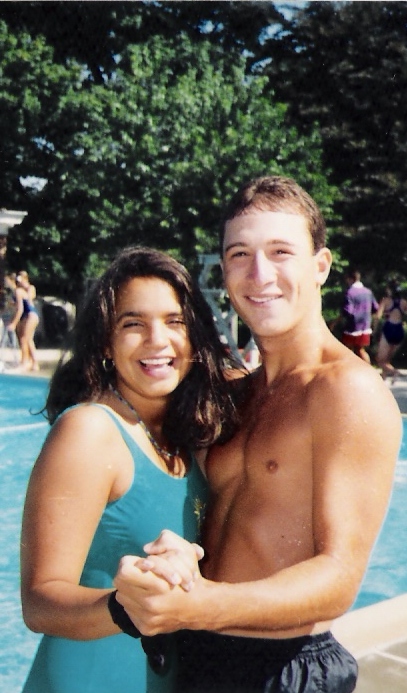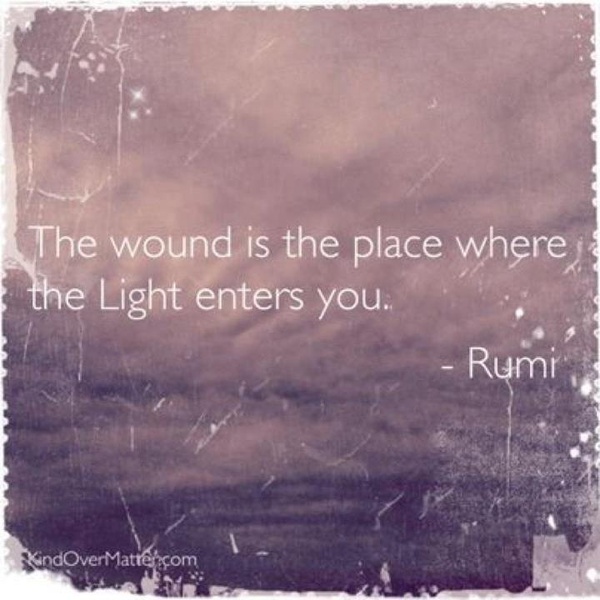collegiate me (and, no, no, not the crush).
I was maybe 20 at the time, working at a summer program with a few of my favorite friends that I had made in college. One of those friends was a young man that I had a ridiculous crush on. Another was a girl, who like me, was in the cultural and socioeconomic minority on campus.
One night, after the endless tasks of our workday were done, my girlfriend and I went to my room to hang out. Eventually the topic of the conversation landed on my crush and my lack of courage in this situation.
“Why don’t you just go for it,” she asked. “He clearly has a crush on you, too.”
And while I knew that he, too, had a crush, I was worried that that was all he had, a little crush without much staying power that would leave me, eventually, crushed. Because here is what I knew about my crush: it was only little because I made it be little. Left to grow into what it wanted to, it likely would have landed on full-fledged love pretty quickly.
I told her about my worries: that I was too sweet, too innocent, too plain to land him forever and, well, if forever wasn’t an option, I wasn’t really interested because the heartbreak would be with me forever. I was just sure of it. Better to just have this smaller crush to deal with then to go in full-heart.
“Why do you think this?” My friend asked.
And I lamented about the other women I saw him with around campus. They were gorgeous, womanly, larger than life. And they were, all of them, skinnier than I was, it suddenly occurred to me.
“Maybe if I was skinnier,” I started. Maybe if I was skinnier…., I was finishing the thought in my head when my friend abruptly, but not as unkindly as it might sound to read it here, said, “Well, you can’t have everything, Rosie. You are already smart and nice and funny and pretty. Everyone needs at least one flaw.”
And, just like that, a scrap of an idea I had just been trying on turned into a clear flaw.
Compared to everyone else in my life, I was fat. And that was my trade-off. You could be known as dumb, ugly, a bitch, or fat and, well, because, maybe, I wasn’t the first three, I was going to need to settle for the fourth.
For several months, those words stung. My flaw is my weight. My flaw is my weight. My flaw is my weight.
With that, I withdrew even more from my crush. I mean, after all, what if he realized that my flaw was my weight?
But a few things started to take shape in my mind.
The first was the realization that I had harmoniously survived my teen years not by bashing myself but by telling myself I had worth and something to give and then reminding myself of that at every turn or hiccup. It seemed wrong to leave my teen years with my self-concept mostly unscathed because of my deliberate attempts to embrace what I did have to offer and then to abandon that practice and arrive in my twenties only to embrace self-hate.
But then there was another thing gnawing at me. Yes, my body was different from most women on campus. I was short and curvy with full breasts, but my ethnicity, genetics, circumstances were totally different, too. Why was I comparing my body to other bodies, other bodies with completely different stories and circumstances than my own? Bodies aren’t meant to be alike or we would have all been cloned rather than individually and powerfully made to revel in our own uniqueness.
I had wanted to find an excuse that would protect me from the fear I had about my crush and I had found it- my body was different- and, for a while, this belief served me well because it kept me from advancing, it kept my heart from being vulnerable, it kept me in the status quo which I knew to be safe (but lonely). But here is the irony. The only thing I accomplished by embracing this idea that my body couldn’t be beautiful was that I made all of me vulnerable; not just my heart but my body, mind, and soul, too. That is what fear does to us makes us misplace the truth that could save us so that we demonize something else and don’t have to face or save ourselves.
And, so, I started to dig myself out from the pressure that my perception of my weight had placed on me.
I journaled. I let go of the negative thinking. I got more real with myself and others. It didn’t happen overnight and it didn’t come without set-backs. But what I ultimately realized is that the only thing I had control over was whether or not I embraced myself. I couldn’t control whether or not my crush loved me forever (although my desire to have control over that insured that I wouldn’t even allow him to love me for a minute). I couldn’t control my body’s natural DNA. And so I refocused my energy on what I could control—my love, respect, and care for myself.
My body has done everything I have asked of it, and, for a while, it did it with very little gratitude from me. When I think about how unkind I have been with my thoughts toward my body while it has simultaneously been so kind to my soul with all that it has allowed me to accomplish, I am humbled. I wish to not ever be that unkind to the vessel that I’ve been given to enjoy and experience this life again. So, that’s the promise I made to my body years ago. You’ve been good to me. I will be good, in all of its manifestations, back.
I am not fundamentally wrong because of my history or physical body. In fact, I am fundamentally right because I exist, because I, just like every other person, was put here on purpose. Ultimately, I chose to recognize my humanity just as I recognize and respect the humanity of others.
This doesn’t mean that some days aren’t hard. Some days are, indeed hard, and I think, “I don’t love my hair or my body shape or my rosacea or this PCOS I have is a pain in the arse.” I think all those things, sometimes, for a moment or two. And then I let them go because those things don’t define me; they don’t limit me; they are not me. They are just stuff, stuff that flavors my uniqueness, sure, but stuff that does not alter who I am or what I have to give to the world.
When a hard moment or day sneaks up on me, I return to my tools (everything I have done to embrace self-acceptance and get out of my own way was eventually compiled together to become the backbone of Beautiful You: A Daily Guide to Radical Self-Acceptance. It’s my prescription, offered to you to help you with your journey) and to my truth.
A lot of times people think self-acceptance and self-care work is really selfish and small-minded and is about the self-esteem movement going entirely too far, but it’s not. It’s absolutely not. How the woman down the street feels about herself can actually impact many of us in significant ways. Just think: what if that woman is a school teacher and she feels defeated. If she can’t call out her best self, it’s hard for her to champion someone else’s best self. That someone else might be your child or grandchild. Suddenly, you want what’s best for her, right? Suddenly, you want her to no longer be paralyzed, right?
We each have a purpose that is uniquely ours. If we are consumed by our bodies, then we are taking valuable time away from the work we are meant to be doing and the gifts we are meant to be giving to this world, from our mission. If we are in the mirror, assessing, obsessing, critiquing, despairing, we are not doing the work of our lives. What are you not doing while looking in the mirror, lamenting your fate? Do you have that kind of time?




